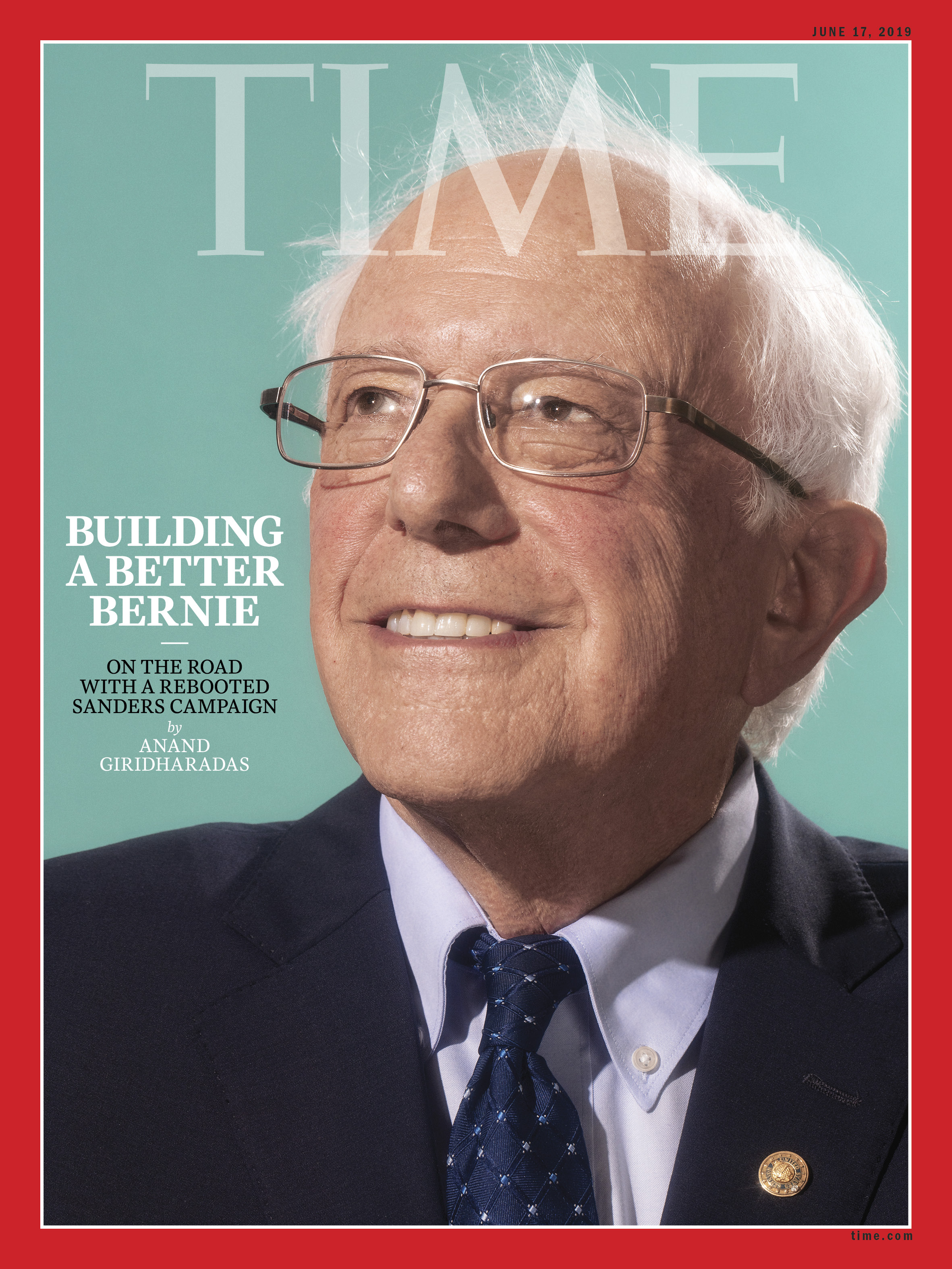Bernie Sanders wants to make a joke. Pretty good joke, he thinks. He is slumped in a window seat in coach on a plane parked at Chicago O’Hare. He has about an hour in transit to get the joke into his next speech. Before deplaning, he pulls his hair forward, but only on the left, the side one may call Bernie, as opposed to the more combed right hemisphere—Senator Sanders. Off the plane. The selfie requests start. O.K., but quickly. O.K., why not, sure. Ooh, was that a Macaroni Grill? Anyone want to go in on a pizza with him? Sausage pizza, O.K. Then selfies with the kitchen staff. Good people. Hardworking people. His people.
His speech for tonight is ready, but Sanders wants to scrap the planned opening for his pretty good joke. Does Terrel—Terrel Champion, his body man, who has mastered the art of knowing when to talk to the Senator and when to leave him be—have the printer? Of course. Last-minute checks about tonight. RSVPs? Good shape—better than early 2015, when barely anyone knew him. A woman at the gate wants a selfie, but Sanders is fixated on the printout of the joke. “Onnnnnnnnne minuuuuuute,” he barks. He loves The People. People can be trickier.
The junior Senator from Vermont flies over the country he aspires to govern, with its crop circles and caterpillar-shaped suburbs and community pools and rail yards full of shipping containers. Soon his silver SUV is rolling through Davenport, Iowa, past a brick building with a sign for German mustard and a soon-to-open hookah bar. The election is a year and a half out, but the crowd at the venue is feverish. Men in boots just off shifts. Young people who may or may not work in the gig economy and listen to the podcast Chapo Trap House. A woman in a purple nurse’s uniform. Beefy guys in trompe l’oeil camo.
He takes the stage and tosses off his blazer. He is taller in real life than on television, though he shrinks by stooping. His cuffs aren’t carefully folded once or twice à la Farm State Casual, but rather jammed up his forearm. “Before I get into my remarks here in Davenport,” he begins, “I did want to make a few comments.” But now, instead of just launching the joke he worked so hard to print out, he first warns them about it. “I wanted to tell you—I’m being funny here, so don’t get excited—that I was a little bit apprehensive about coming back to Iowa.” He reminds them how President Trump had falsely linked wind turbines, which are ubiquitous in Iowa, to cancer. “So I was sitting here wondering,” he says, “if I come to Iowa, am I and my staff going to get cancer?”
Running for President is like doing stand-up. You try bits, see what sticks. The room liked it, so the next morning the joke resurfaces in Muscatine, again with a warning, because Sanders, who can be funny unintentionally, is making an effort at some of the performative aspects of politics he has long sneered at. “I told a funny joke yesterday,” he says to the audience, adding: “I try. I don’t have the world’s greatest sense of humor.” Several hours later, in Fairfield, he tries again. It takes another day for Sanders to offer the joke without advance notice.
On the way out of Oskaloosa, wind turbines appear. A viral video opportunity. The SUV carrying Sanders, the staff van and the luggage-bearing minivan all swerve to the side of US 63. Sanders, with a few aides, prepares to cross the two-lane highway. “Be careful!” he yells. It’s the kind of Old World, survivalist caring Sanders is capable of in public: Don’t die; Have you eaten?; Remember your luggage; Don’t leave your charger.
Now the Senator, 77, stands before the wind farm in his gold-buttoned blazer and slacks, looking like a traveling Rotary Club speaker, facing a cameraman in yellow skinny jeans who looks young enough to be his grandson. He improvises, theatrically throwing his hands over his ears, as if protecting himself from the allegedly carcinogenic turbine sound. “Oooohh, that noise,” he cries. “Can’t think.” He takes his hands down. “Just kidding. No noise.” He moves into a more serious riff. The opener is funny, but his video team finds it gimmicky. So they cut it.
Sanders first ran for office in 1972, campaigning for an open Vermont Senate seat on the Liberty Union Party ticket. He lost, attracting 2% of the vote. One of his opponents was a Democratic state representative named Randolph Major. As Sanders recalls in a memoir, Major invented a “brilliant publicity gimmick”: skiing around the state to meet voters. Sanders later complained, “Here I was, giving long-winded statements to a bored media about the major problems facing humanity, and the TV cameras were literally focused on Randy’s blisters.” Sanders was 31. He was, even as a young man, an old man.
Now, nearly a half-century later, he is an old man who enraptures the young. The Senator who once rejected gimmicks and complained “modern American politics is about image and technique” now scripts jokes and asks after his Twitter likes. He is pretty much the same man he has always been, but he is determined to take advantage of being one of the more improbable top-tier presidential contenders in American history.
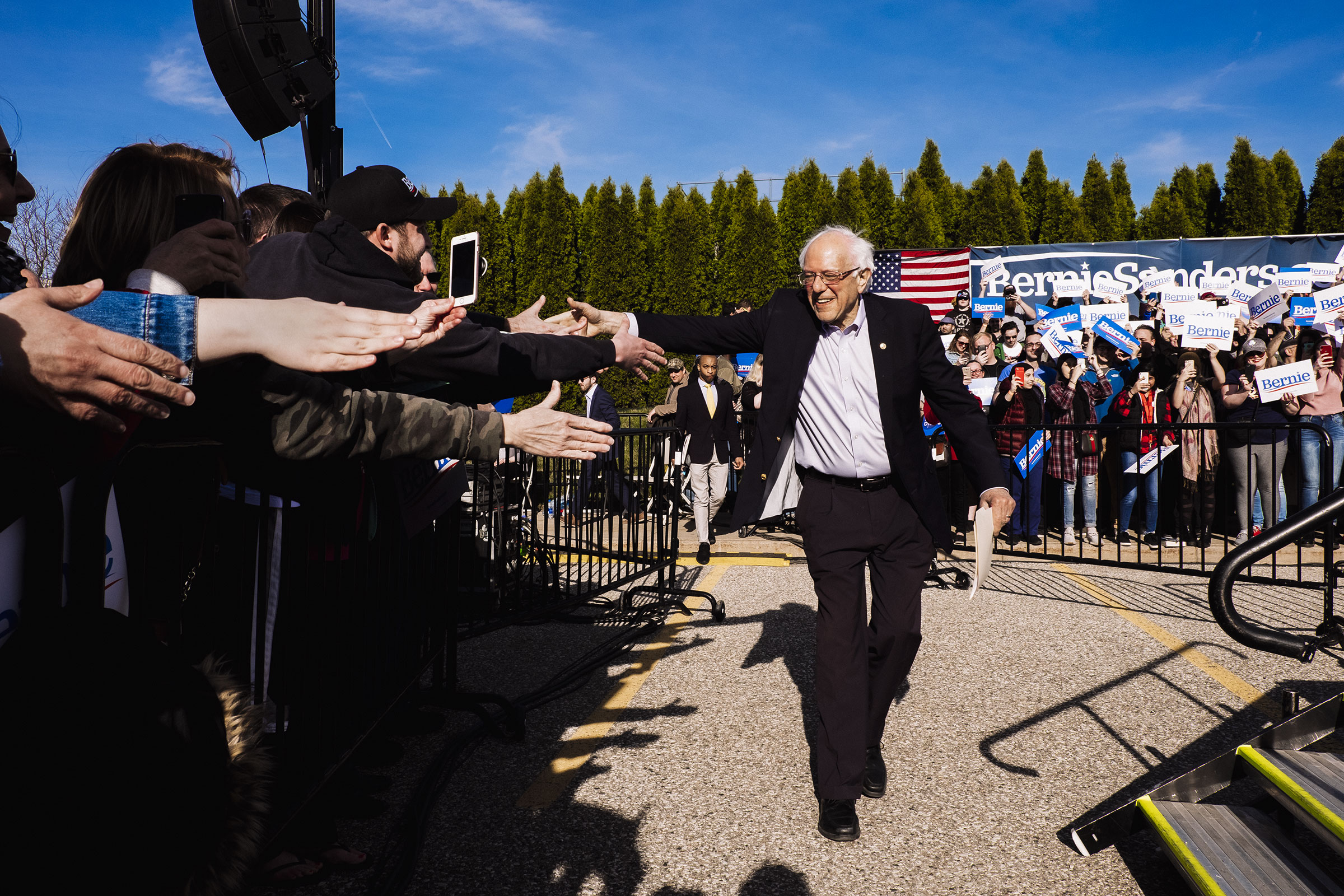
When Sanders ran for President in 2016, it was because he felt important ideas were unrepresented. Many of his positions were dismissed as radical, vague, wide-eyed. Yet as the 2020 race gathers intensity, much of the Sanders program has become de rigueur for progressive and centrist Democrats alike: single-payer health care, massively subsidized college education, a $15 minimum wage, a federal jobs program. Senator Cory Booker of New Jersey supports some form of Medicare for All. Former Vice President Joe Biden recently embraced a $15 minimum wage. The idea of federally provided jobs, evocative of the New Deal, has gone from being a far-out Sanders talking point to an idea that has more moderate adherents like Senators Kamala Harris of California and Kirsten Gillibrand of New York.
During eight days on the campaign trail with Sanders this spring, I heard one refrain as much as any other: a “funny thing had happened” since 2016, and Sanders’ ideas were no longer “radical.” “Brothers and sisters, we should be enormously proud that we have come a long way in transforming politics in America over the last four years,” he told a crowd one sunny April afternoon in Warren, Mich.
Sanders has changed the debate in great measure because he has never really changed himself. His consistency is the selling point—his mantras against billionaires stealing the American Dream, the system being rigged, working people needing to form a movement to take power back. And yet he is now running against nearly two dozen competitors, many of whom have chipped away at his distinctiveness by emulating his stances, and just being Bernie may not get the job done. Sanders is solidly in second place behind Biden in national and state polls. And while the movement he built in 2016 has proven durable, there are few signs that it’s growing. Between March and May, according to a national survey by Monmouth University, Sanders’ support dropped from 25% of likely Democratic votes to 15%, as several rivals increased their share.
There is a feeling in Sanders’ orbit that he will, in certain ways, have to evolve if he wants to do more than change the conversation. Tell his story more. Navigate the shoals of racial and gender politics with greater awareness of contemporary expectations and his own blind spots. Overcome his self-image of being a solitary outsider—alone, unheard, disrespected—and cultivate allies. “It’s one thing to talk to your 20% to 25% who are your core believers, but we’ve got to work on persuading people into the fold,” Faiz Shakir, Sanders’ campaign manager, told me. “And that’s why it takes, I believe, a continual evolution of the message, freshening up the message and also sharing more about him.”
Changing the conversation isn’t nothing. William Jennings Bryan (three times the Democratic Party nominee for President) changed the conversation. Eugene Debs (five times the Socialist Party nominee) changed the conversation. George McGovern (who lost 49 states to Richard Nixon in 1972) changed the conversation. But activists and prophets seldom earn the chance to end up in command of the 4th Infantry Division or sit knees-to-knees with Vladimir Putin.
Yes, Sanders has already changed the game. A question lingering over him is, To win that game, can he change?

Feel the Pain
If the keyword of Bernie 2016 was rigged, Bernie 2020 is about pain. It is a campaign about stress and anxiety, about tens of millions of people suffering alone, together.
I traveled some 6,000 miles with Sanders this spring, by bus, plane and van: Manhattan; Moline, Ill.; Davenport and Muscatine and Burlington and Fairfield and Oskaloosa, Iowa; Las Vegas; Washington; Madison, Wis.; Gary, Ind.; Coopersville and Warren and Detroit, Mich.; Lordstown, Ohio; Pittsburgh and Bethlehem, Pa. Talk of a rigged system has hardly vanished, but now Sanders focuses on the human toll of a rigged system, rather than just the profiteering and exploitation and lobbying and campaign contributions he is famous for decrying. As one staffer explained, Sanders is “assigning an emotion” to the rigging. He is, in this and other ways, learning to be personal.
“From the very beginning, he was always concerned about policy. Always concerned about making a meaningful difference. He didn’t have time for the niceties,” Jane Sanders, the Senator’s wife and closest adviser, told me. “He has, over time, really become more—he’s still very issue oriented, but he’s placing focus on the people and the impact that those policies have.”
That new focus was evident this spring in a less familiar event format for Sanders: intimate, almost confessional town halls. A panel of three or four ordinary citizens would share stories of their hardships, and others in the audience would share their own tales, and Sanders would respond with a mix of awkward sympathy, synthesis of their situations and his stump speech.
In the theater of a Burlington, Iowa, school one afternoon, three panelists, all women, sat onstage with Sanders. The first, Carrie Duncan, spoke of her trouble getting health insurance: not having coverage when she worked in a school cafeteria in a nonunion job, getting coverage when she landed a union job in an ammunition plant and then losing it again because of rising costs. “The fat cats continue to grow richer by drinking from the big bowls of cream that us little cats get for them,” she said. “It’s time to make the fat cats meow!” A nurse practitioner named Teresa Krueger spoke of living with Type 1 diabetes and her work caring for patients with that condition, many of whom cannot afford insulin, which has surged in price over recent years.
Then came Pati French. “I’ve been married for 26 years and had three great kids,” she said. “We have had a good life. We have made lots of memories.” Then she told the story of her son. Trevor was into music and politics, and in 2016 he canvassed for Sanders. He also had a pill addiction. He struggled and then he got help and got sober and was seven months clean with his own job and apartment and was proud of himself. Then he felt a surge of anxiety, the old demons returning, and went to a clinic and got 140 pills and instructions to go see a counselor when a vacancy came up. But he didn’t get in before an accidental overdose killed him. “We have never been the same,” French said. Sanders, turning bright red and somber with emotion, reached out and gave her a few comforting pats.
The audience began to give their testimonies. A woman spoke of the dearth of mental health care resources and how she had lost two of her friends to suicide and seen others struggle to get help—“including myself, who I have almost lost many times.” A man who works at McDonald’s spoke of scraping by on nine bucks an hour. A man from the local steel plant spoke of jobs vanishing to India and the Czech Republic. And a woman who grew up on a family farm spoke of crop prices falling and bankruptcies climbing.
As these stories and emotions poured in, they landed on the shoulders of a man who is, depending on whom you ask, a person of great empathy or a gruff curmudgeon. “I think everybody thinks I’m very somber and very angry and very, very serious,” Sanders told me in Ohio, “which is half true.” Faced with these testimonies of struggle, Sanders doesn’t usually do what other leaders do in our therapeutic culture: doesn’t hug people, tell them he feels their pain, ask follow-up questions about how the family is doing. What he does with their pain is analyze it; contextualize it; connect it to laws and agencies and instances of greed they may not know about; and offer it back to them as steaming, righteous, evidence-based anger. People tell him of the bill they can’t pay that keeps them awake, and he tells them that the chief executive of the local insurance company makes however-many million. Throwing percentages at them like little darts, he gives them the statistics that might explain their pain, gives them a thesis to connect the dots of their lives. He teaches them to look at themselves in a new way—systemically.
“There’s a lot of individual credit and blame in a capitalist society,” Jane Sanders told me. She described Bernie’s message in the town halls as: “You know, this is not an individual failure that you’re having trouble meeting your bills, or that your health has suffered because you can’t afford health care. He tries to give them a context that says, ‘Hey, stop blaming yourself. Start thinking about how you, in a democracy, can help change the system.’”
After a few of these town halls, Sanders’ own stoicism makes more sense. He begins to seem almost a secular priest: People come to him with stories of despair, and he lifts their pain up into the air, to a place where it is no longer personal but something civic. He gives them the language and information to know it isn’t their fault. His speeches are like that hug in Good Will Hunting. It’s not your fault; it’s not your fault. The system did this. Big corporations did this. A bought-and-paid-for government did this. He connects their pain to the pain of others, and in the process that pain is remade, almost transubstantiated, into a sweeping case against a corrupt system. The priest, in this metaphor, doesn’t reveal himself because his job is to float above his own feelings, own needs, own desire to be liked. His job is to make space for, make sense of and make use of your pain.
This covenant with his supporters is his great achievement. No rival for the Democratic nomination has anything quite like it. Even Steve Bannon, the right-wing populist who ran Donald Trump’s presidential campaign in 2016, admires it. Sanders’ agenda is “a hodgepodge of these half-baked socialist ideas that we’ve seen haven’t worked,” Bannon told me in his office on the Upper East Side of Manhattan, sitting in front of a painting on which the words Follow your dreams were written above a monkey sitting on a Coca-Cola box. But, he said, “Bernie has done a tremendous job of galvanizing a segment that hasn’t gone away. I mean, he has a real movement.”
Building a following fueled by pain and personal hardship is an especially big accomplishment for a candidate who is himself so emotionally inaccessible, reluctant to share more than the barest glimpses of his own history and inner life. “Not me. Us.” is his 2020 campaign slogan, and he means it. “Almost to a tee, what defines a politician is they love to tell their story,” Shakir told me. “He has absolutely zero inclination to do that. He abhors it.”
Sanders seems to believe the public doesn’t have a right to know him more intimately—even though there is abundant evidence that the essential character traits of our Presidents eventually shape all our lives: Bill Clinton’s appetites; George W. Bush’s certitude; Barack Obama’s instinct to hire bankers; Donald Trump’s narcissism. In our first interview, on a bench in the Des Moines airport, I asked Sanders a simple question: How did he first experience the idea that people blame themselves for systemic problems? “Well, before we get to me,” he said, “what the political revolution is about is the millions of people beginning to stand up …”
Many of Sanders’ advisers are eager for the Senator to get more personal. They know they have a good story to tell. Sanders is, after all, the son of an immigrant, a first-generation college student who grew up in a paycheck-to-paycheck family. He is a Jew whose relatives were murdered in the Holocaust, campaigning in an era when the President of the United States has said a group of neo-Nazis contained “very fine people.” He was at the 1963 March on Washington when Dr. Martin Luther King Jr. confessed his dream. His aversion to personalizing can be self-defeating.
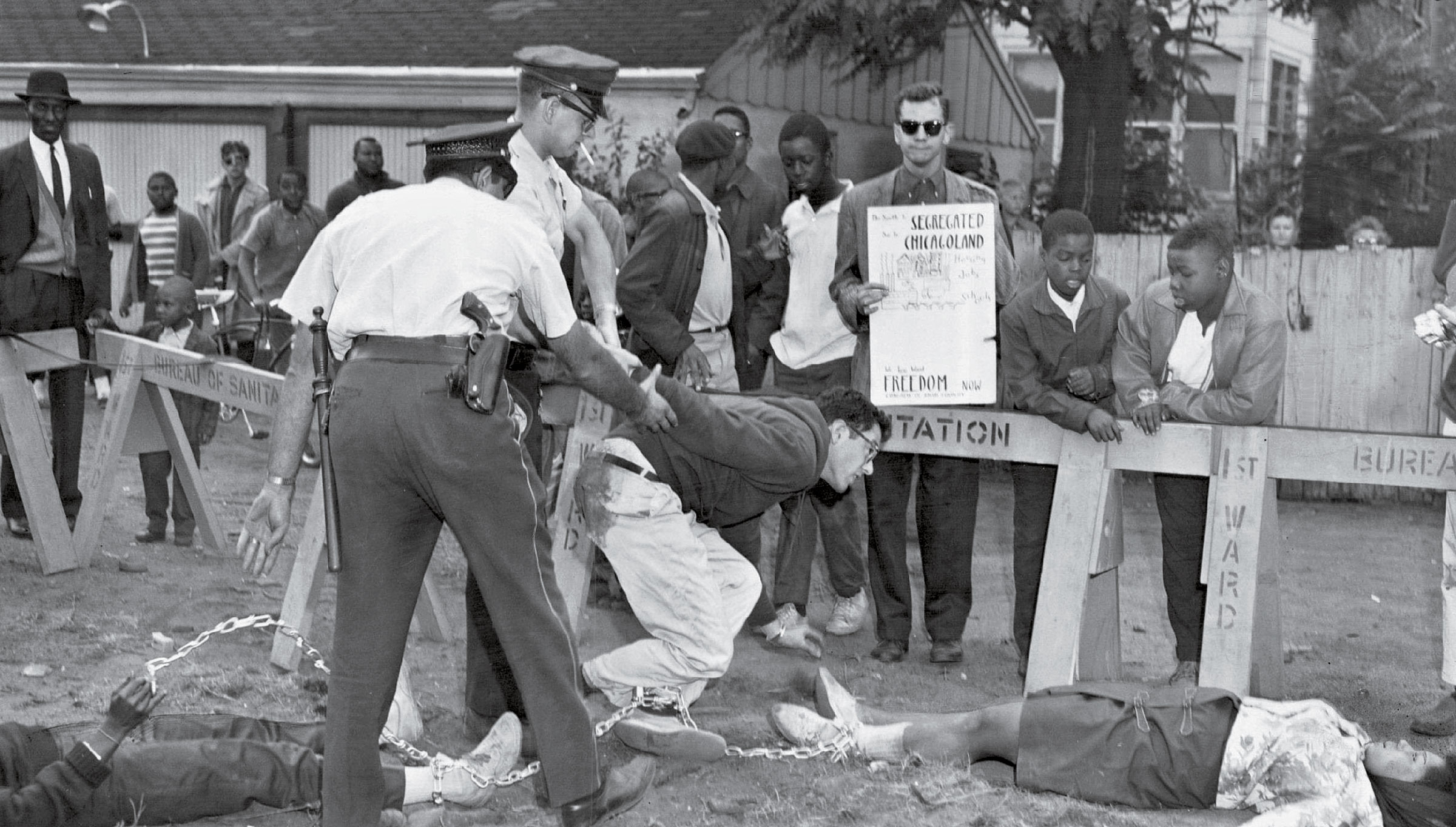
These days, Sanders is trying to go there. “As I return here to the area that I was born, let me say a few personal words,” he said at the March 2 kickoff of his campaign in Brooklyn. “As we launch this campaign for President, you deserve to know where I came from—because family history, obviously, heavily influences the values that we develop as adults.” He talked for a few moments about his childhood and his parents, looking even graver than he usually does, staring at his notes constantly. “I know where I came from!” he screamed, out of nowhere and with great feeling. “And that is something I will never forget.”
Bernard Sanders grew up in a cramped, rent-controlled apartment, No. 2C, in a six-story brick building on East 26th Street in the Midwood neighborhood of Brooklyn. He was the son of a paint salesman dad who immigrated from Poland and a homemaker mom born in New York. He grew up playing punchball in the street, attending Hebrew school on weekends, poking around Chinese and Jewish eateries on Kings Highway, and running cross-country at James Madison High. The family wasn’t poor, but there wasn’t enough not to worry.
In one of our interviews, Sanders told me he and his brother Larry slept on living-room sofas for much of their youths. “The first time I had my own room was, I think, my second or third year at the University of Chicago,” he said. In school, young Bernie felt inferior: “Baseball gloves other kids got were the better gloves, and the sneakers were better sneakers, and the clothing was better.” When Sanders thunders, “I know what it does to a family to live paycheck to paycheck,” he seems to be excavating his own pain. I tried to understand what that looked like.
“It looked like a lot of arguments between my mom and my dad,” he told me. “Virtually always over money. And, you know, my mother wanted more than we had, and there was always pressure on my father, and it led to a lot of stress.” He has written that “almost every major household purchase—a bed, a couch, drapes—would be accompanied by a fight between my parents over whether or not we could afford it.” In Sanders’ telling, his father was more content with what they had because, born into poverty in Poland, he knew worse. It was different for Sanders’ mother: “She was an American. And she said, ‘Let’s do this. I want a home of our own.’” She longed to leave the rent-controlled apartment where her children slept on a sofa. She died at 46, her dreams unrealized.
Jane Sanders was more willing than Bernie to talk about that death. “He was 19 when his mother died,” she told me. “And his father died right after that, a year later, and his brother moved to England.” (Given her husband’s lack of enthusiasm for discussing his past, Jane can be forgiven for these details being just slightly off: he lost his father two years after his mother. His brother moved to England after Bernie finished college.) “He was alone in the world, you know? I think that is a very strong impact. He doesn’t need other people’s approval. He is used to being an independent because of all that.” As an origin story, it offers another way of looking at the Senator’s record as the longest-serving independent in congressional history.
“And so he’s alone, right?” Jane continued. “Think about that. He’s alone in the world. He’s at University of Chicago. He’s spending most of his time in the stacks, rather than in class, reading about everything.” Among the books Sanders found were those of Debs, the Socialist leader about whom he would later make a documentary. It was at this time, orphaned and at a distance from his brother—who had introduced Bernie to serious reading and, he has written, “opened my eyes to a world of ideas that I otherwise would never have seen”—that the future Senator became interested in civil rights. He joined the campus chapter of the Congress of Racial Equality and helped lead a sit-in against university administrators for discriminating against black students in off-campus housing.
He became so consumed by activism that a dean, seeing his low grades, suggested he take time off. “He’s not a partyer,” Jane said. “No drugs and no alcohol. He was not into that, so that college experience at that particular moment in his life, I think really formed the foundation of his life’s work.”
I asked Jane if she thought her husband had ever processed that string of losses. “I don’t think he bothered to process it at the time,” she said. “I think that they both escaped it.” Later on, she said, both brothers grappled with the pain and meaning of their parents’ lives—assisted by a 2013 trip they took to Poland with their wives.
I asked Jane whether Bernie’s early pursuit of justice could be seen as a way of coping with loss. “I don’t know,” she said. “I think at that point in our lives, no matter who we are, we’re searching for ourselves. And if our entire family at that same time is gone, you have nothing to lean on. So I think the search becomes more important and more dramatic.” Deserted at that time by love—warm, messy, emotional, individual—Sanders found justice—cool, systematic, analytical, collective. A justice he now seeks for all of us.
In that Ohio hotel, Sanders repeated his mantra about personal life being unimportant. “I don’t talk about myself all the time. I get criticized for that. But, you know—”
“You’re learning to do it a little more,” I cut in.
“I’m learning to do it a little bit. All right?”
The interview was over.
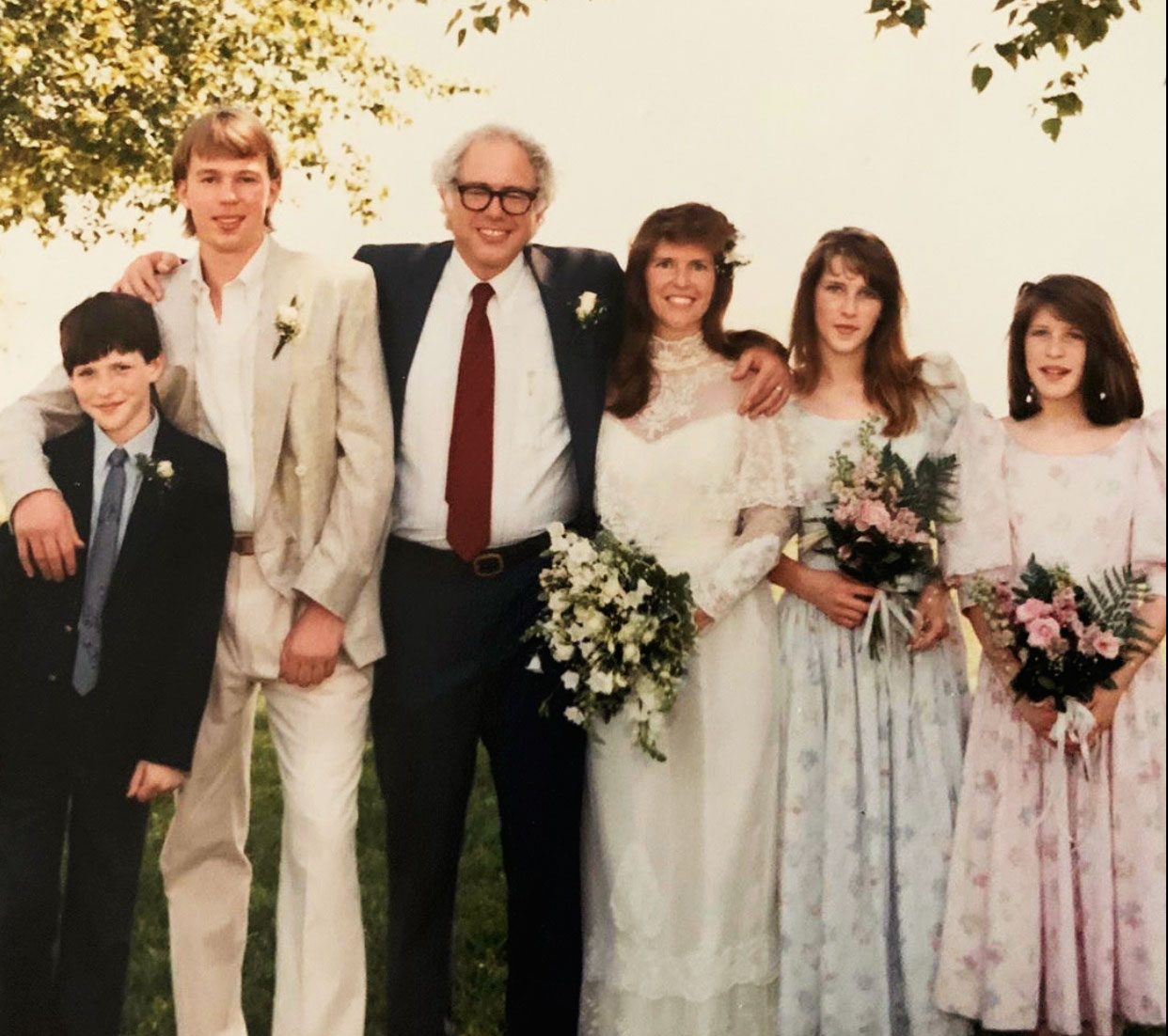
The I-94 Primary
America blurs by: Fairfield Inn, Maggiano’s, AMC, Canon, Courtyard Inn, Applebee’s. Adult toy stores, tractors the size of Sanders’ boyhood apartment and homes tucked behind woods with a lone floodlight bearing witness over the garage.
The message of the Bernie 2020 Midwest battleground states tour was not subtle. The campaign wants to prove it can recapture states former Secretary of State Hillary Clinton lost to Trump in 2016. One of those states is Michigan. And, within Michigan, Macomb County is the kind of place Sanders thinks he needs to win.
Macomb is the county that made “Reagan Democrats” famous. It is 80% white, full of those non-college-educated, white, working-class voters—the Diamond Medallion Priority Pass members of American politics. And so on that April afternoon in Warren, Sanders made his case to a county that had voted for John F. Kennedy and Ronald Reagan, George W. Bush (only once) and Barack Obama and Donald Trump.
He began by listing states that Trump won. “We’re here today to say, That mistake is not going to be repeated in 2020,” he shouted. The word mistake was the crux of the pitch: in his retelling, Trump ceased to be a demagogue who campaigned on bigotry and jingoism, and any appeal of those ideas among Macomb voters remains unexplored. “When he was running for President,” Sanders said, “the very biggest lie that he told here in Michigan and in Vermont and all over this country was that he was going to stand with the working class of this country.” In this rendering, Trump is a President whose sin is having pretended to be Bernie Sanders while turning out to be Paul Ryan.
Perhaps this is what victory in Macomb, and Macomb-like places, demands: a redacted retelling of 2016, so a candidate can indict Trump without indicting anyone who voted for him. Earlier on the tour, in Madison, Wis., Sanders had been even more explicit. “I can understand why people voted for Trump based on what he said,” Sanders told the crowd. “There is a lot of pain out there.” He said this even though there is now good evidence that voting for Trump was more associated with a desire to stay on top than with suffering at the bottom. Later, in Pittsburgh, Sanders would declare, “Hey, Mr. Trump, you’re not like you say you are.” Which is both true and seemingly in denial of all the ways the President is totally what he said he’d be.
With Trump in the White House, Democrats cannot ignore Macomb. But there are other votes that need to be courted. Minorities and women, and black women especially, are the lifeblood of the modern Democratic Party—and for them, Sanders’ way of diluting the truth about Trump voters can be troubling.
The dilemma came to a head an hour later. We got off the bus at Detroit’s Sweet Potato Sensations, a bakery famous for its sweet-potato pies ($14 for a 9-in.). The audience was almost entirely African-American women. Sanders stood among them and took questions. A woman named Janis Hazel rose. She said she used to work for Representative John Conyers, a long-serving former House member from Michigan. Conyers (with Hazel’s assistance) had long ago proposed a bill mandating a commission to study how reparations for descendants of slavery might be undertaken in the U.S. Hazel asked Sanders whether he backed the idea, which Conyers had reintroduced each session until he resigned in 2017 over allegations of sexual harassment.
Before she could finish, Sanders cut her off, undermining the proposal by reminding people that it is merely for a “study.” She tried to complete the question, and again Sanders jumped in. “Well, I’ve said that if the Congress passes the bill, I will sign it. It is a study.” He pivoted. “You know Jim Clyburn from South Carolina? Clyburn has a bill which I like. He calls it ‘10-20-30.’” The plan calls for 10% of all funds from certain federal programs to go to distressed communities to rebuild those communities.
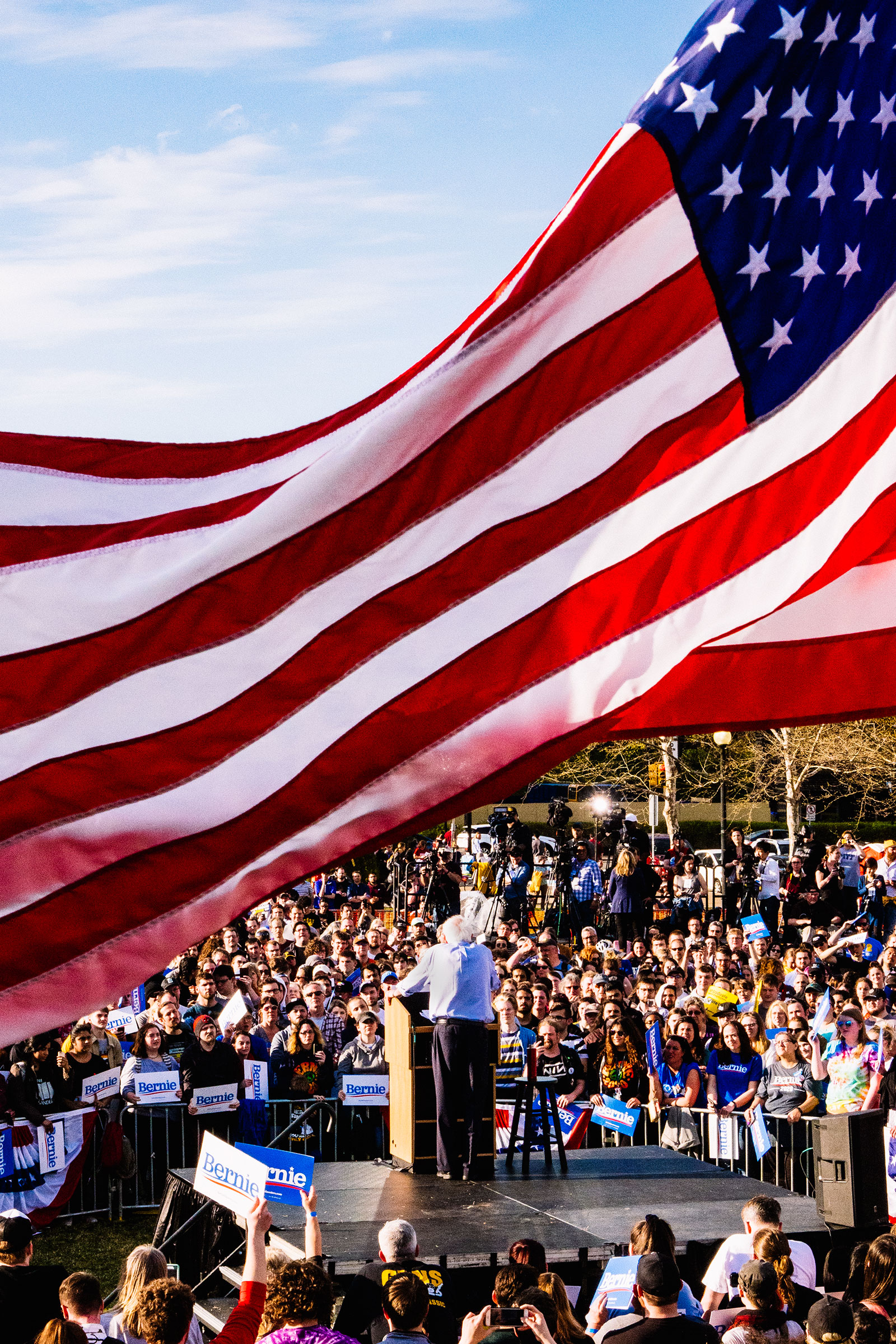
Afterward, Hazel told me she felt Sanders avoided her question. As it is, he had only recently come around to his tepid support for studying reparations. And his irritation at being pinned down on the issue was revealing. The dismissal of a mere “study” suggested an unfamiliarity with what advocates for reparations seek: a program so sweeping it would be impossible to administer without years of forethought.
The interaction also called into question Sanders’ ability to navigate the complex social terrain that is the Democratic electorate in 2019. A room full of black women who didn’t seem bought into the Sanders agenda were trying to figure out, as all voters are, if he got them. There were a thousand ways in that moment to say, “Yes, I back reparations” or even, “No, I don’t, and here’s why,” and still convey your grasp of what lay beneath the question—the desire to be seen and reassured that your community wouldn’t be forgotten. But Sanders didn’t do that.
The Democrat who emerges to take on Trump in 2020 will have to compete for those Reagan Democrats and those black women, two tribes living in different worlds, a short distance apart on I-94. An issue like reparations is a perfect example of how difficult this can be; pleasing Detroit may hurt you a few exits to the north.
In presidential elections past, the tension between what Macomb wanted and what Detroit wanted tended to be resolved in Macomb’s favor. But 2020 seems unlikely to repeat that history. It is being called the “woke primary” by people on the Republican side, because of the early pressure on candidates to take positions on questions of race and gender and identity—questions that matter to people other than white working-class men. The high maternal mortality rate for black women. Transgender rights. The question of when physical contact between men and women escalates from friendly to predatory. The problem of combating hate crimes.
The woke primary is a challenge for Sanders. In part because he is an old-style leftist whose overriding lens is class, not identity. In part because woke culture often craves the kind of gesturemaking to which he’s allergic. And in part because Sanders seems to struggle with the expectation that a 77-year-old white guy needs to learn, evolve and prove that he “gets it,” even if he was at Dr. King’s march.
The 2016 campaign left a residue of doubt about Sanders’ ability to navigate both ends of I-94. Critics complained that his signature campaign advertisement, set to Simon and Garfunkel’s “America,” featured overwhelmingly white faces. His campaign leadership was “too white, too male,” as Sanders himself has put it. There was the time in 2015 when Black Lives Matter activists, unsatisfied with Sanders’ responses to the problem of police violence against African Americans, interrupted a town hall at which Sanders was speaking. “Shall I continue or leave?” Sanders asked. “I’ve spent 50 years of my life fighting for civil rights and for dignity,” Sanders added, turning toward the protesters. “But if you don’t want me to be here, that’s O.K.”
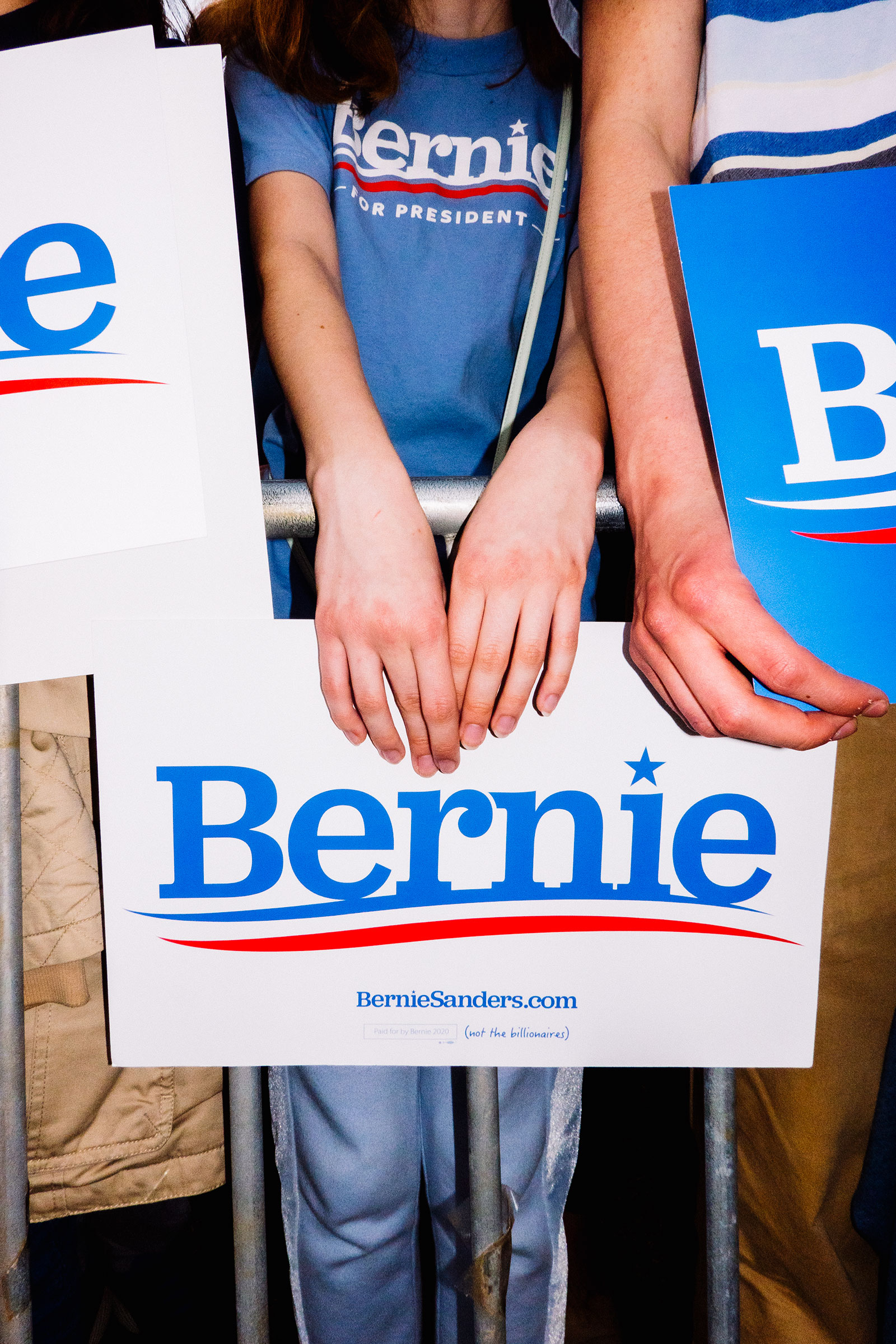
The Sanders campaign is adamant about two things: First, the notion that Sanders has a “black problem” or a “woman problem” is made up—a narrative pushed by the Clinton camp in 2016. The campaign says that Sanders actually does well among young voters of all groups; his support weakens as people climb toward his age. And, second, yes, there were real problems that weren’t a planted Clinton narrative, and they are working hard to solve them. Every major team on Sanders’ 2020 campaign now has women in leadership roles; the campaign claims a majority of its national leadership team is female. Shakir is the first Muslim-American boss of a major U.S. presidential campaign. In response to sexual-harassment complaints in 2016, the campaign announced a slate of measures and published detailed guidelines to curb the behavior.
But what makes Sanders an awkward fit with the woke era goes deeper than missteps. He is philosophically committed to a view of the world that can sometimes conflict with the expectations of 2019 identity politics. As a democratic socialist, he sees economic inequality as the paramount issue in American life—and racism and other injustices as derivative of it. When asked, for example, about the 2015 death of Freddie Gray after being taken into custody by Baltimore police officers, Sanders talked about the “short-term” fix of police reform, before suggesting that the “long-term” solution was better employment opportunities to get young African Americans off the streets—which isn’t necessarily a fix given that police have also gunned down unarmed black men in their cars and backyards.
David Sirota, a Sanders speechwriter and senior adviser, calls him a devotee of “the actual Dr. Martin Luther King,” as opposed to King the symbol. Sirota says Sanders is committed to “a multiracial, class-unifying agenda,” in keeping with King’s Poor People’s Campaign, which married the quest for civil rights with outreach to poor whites. Briahna Joy Gray, Sanders’ press secretary, who is black, insists Sanders’ universal emphasis is appealing to many working-class African Americans, who favor programs like Medicare for All and free public college. A Quinnipiac poll of likely Democratic voters in late March found Sanders is the second most-popular candidate among African Americans, after Biden, with twice as much support among such voters as the leading black candidate, Harris. As reporter Perry Bacon Jr. of the political site FiveThirtyEight put it, “While some black political activists may dislike the Vermont Senator, there is little evidence that black voters do.” However, it’s also true that Sanders remains less popular among black voters than the electorate at large.
Some members of the campaign say Sanders can improve at translating his dedication to social justice into the language of now. “Obviously, we’ve got to do a better job of communicating that record and that vision,” Jeff Weaver, a longtime adviser, told me. Sanders, he said, needs to articulate his ideas “in a culturally competent way.”
Lonely No More
One of the final stops on Sanders’ Midwest battleground tour was a nurses’ convention at the Mohegan Sun Pocono “racino”—a mix of racetrack and casino—in Wilkes-Barre, Pa. Sanders stood before a room full of nurses in red T-shirts and spoke to them about their own hardships, with real empathy and knowledge. He mentioned patients who cut their pills in half to save money, and nurses who spend hours on the phone haggling with insurance companies. The nurses roared the roars of being seen. He was serving them anger made of their pain, and they lapped it up.
Then, having spoken about their lives, he vanished. No time for pictures, no handshakes, no hugs. He told them how essential they were to the republic, and peaced out. You could see the disappointment in many of the nurses as they rushed to the front to no avail, confused into believing that a man seeking their vote might be interested in them as people, not just as examples of a thesis.
The racino was not a fluke. Along our 6,000-mile journey, when Sanders came upon a voter in an airport or on a sidewalk and the situation demanded a smile, he gave the smile my 4-year-old gives when he knows that greeting our dinner guests nicely is the price of staying up. He didn’t display a typical politician’s interest in people’s names, how long they’ve worked in a place, their story—unless it was an event about their story. He barely engaged with the press, not even just popping onto the bus to say hi and build goodwill. Sanders is a crusader with little patience for small, human things—macro-compassionate, micro-cantankerous. “There is a gruff, no-nonsense aspect of his personality,” Gray told me. “It’s not reserved for people; it’s reserved for, I think, what he perceives as distractions from people. Distractions from the issues that really matter.” But will the traits of the crusader, which have gotten him to the threshold of the threshold of power, be enough to get him through the door? Or does the crusader—too focused on health care to do small talk—need to learn that sometimes you have to ask about someone’s kids to get everyone’s kids health care?
The relational side of politics may matter more for Sanders in 2020 than it did in 2016. Then, Sanders benefited from being the clear alternative to Clinton. In 2020, he is still a rare bird but no longer unique. Senator Elizabeth Warren of Massachusetts also talks about a “rigged” system, but offers a contrast in demeanor, gender and can’t-stop-won’t-stop policymaking. Pete Buttigieg, the mayor of South Bend, Ind., targets many of the same Midwestern, Trump-curious, white, working-class voters, but is a sunny young guy who is about reclaiming the right’s freedom-and-security patois.
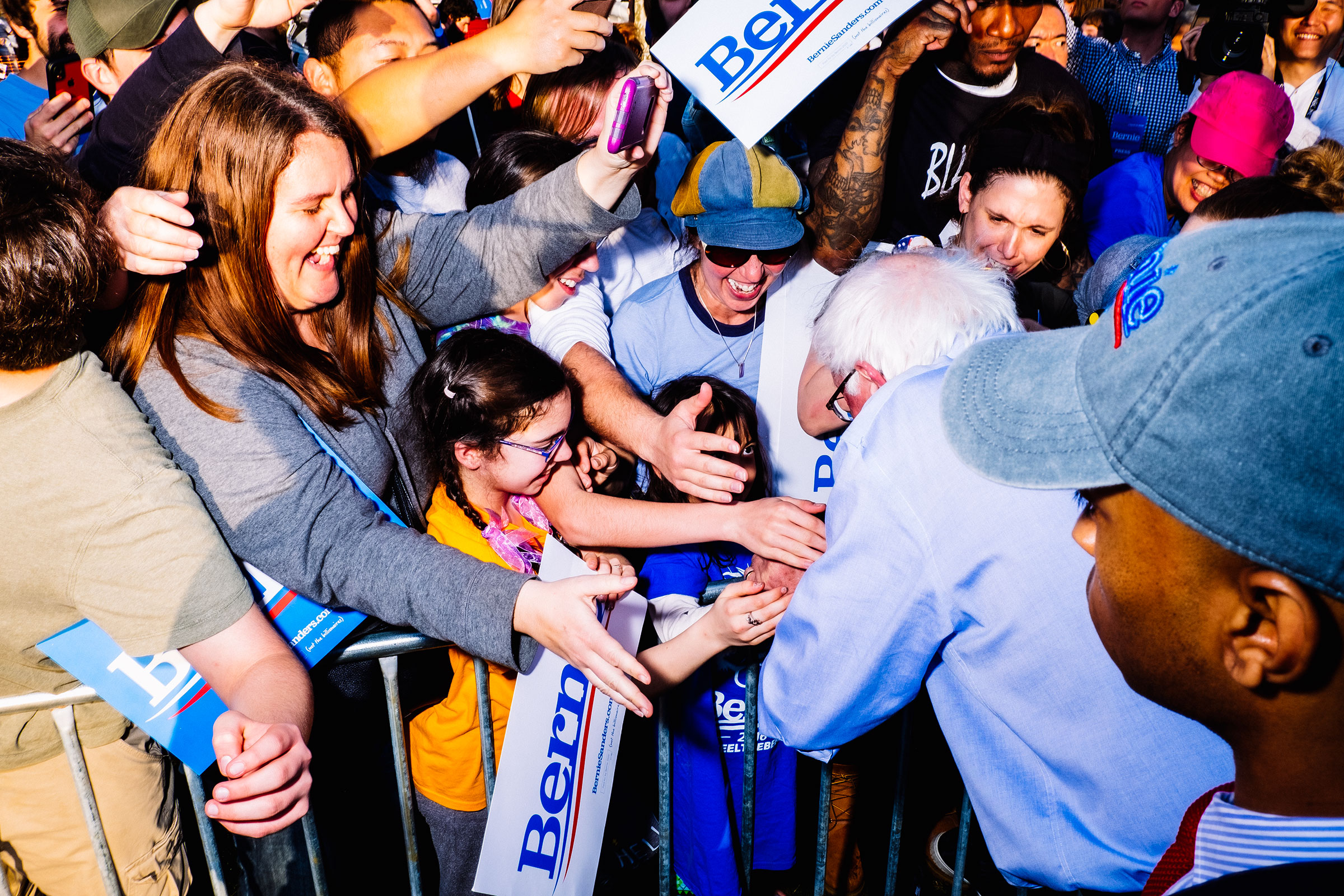
Faced with such competitors, Sanders will need to broaden his appeal beyond diehards. “A movement that wins,” Shakir says, “is a movement that grows.” And to grow, Sanders may have to be more than a moral crusader. He may have to cultivate people who aren’t fully on board with democratic socialism but are drawn to who he is and what he stirs in them. He may have to use every last tool of political connection. Which is why it matters that he sort of hates using many of those tools, and doesn’t even own some of them.
It is possible to argue that Trump’s election proved these human qualities don’t matter anymore. Maybe all the flesh-pressing and self-revelation and courting of the media, county chairmen and other political gatekeepers is no longer how the process works. Maybe the process is now citizens’ drinking in the candidates via social media and cable. Among the many differences between the front runner for the Democratic nomination, Biden, and Sanders, who sits in second place, is whether the performance of humanity still matters in politics. Biden vs. Sanders is a perfect experiment—tactile vs. sterile, too much rubbing vs. rubbing people the wrong way.
When I asked Shakir what Sanders needs to do that he has not done before to grow his following, he mentioned “things behind the scenes that probably aren’t as well-observed,” like making phone calls to local leaders. He cited a small dinner the Senator had attended with labor leaders after his big rally in Pittsburgh. The example surprised me, because it sounded like something politicians do all the time.
That Sanders is innovating on such things 47 years after he first ran for office tells you that 1) he has gotten far being himself, and 2) his aides aren’t sure being himself will make him President. He has done quite well playing the role of the back-bencher, the righteous loser, the gadfly who can’t get no respect. But he is now a top contender for the presidency, much loved and much hated, and one test he faces in 2020 is whether he can overcome the personal toll of his own immense achievement.
This is, after all, a man who spent decades “shouting at a cloud,” as a staffer on a rival campaign put it to me, half-put-down, half-compliment—a man who has characterized his own life story as “a story of struggle.” He saw something and said something about America that was gauche to say for most of his career. “I have cast some lonely votes, fought some lonely fights, mounted some lonely campaigns,” he wrote four years ago as he launched his 2016 campaign. And the loneliness of his fight gave rise to the tendencies you’d expect: suspicion of everyone but his most trusted counselors, contempt for the press, paranoia about “the establishment” being out to get him, fixation on the Big Picture at the expense of individual human pixels. He fought on, and the trends he spoke of intensified, and people started to see that maybe the world was flat only for Thomas Friedman, maybe it was the best time in history only for Steven Pinker and maybe inequality truly was a big problem. Suddenly both Republicans and Democrats were running against the “rigged system,” and billionaires from Aspen to Davos began to feel unloved.

In so many ways, Sanders led that turn. He made his message mainstream enough to win 22 states, pulling Clinton to the left in the process. He helped change the conversation about capitalism and how it relates to that other great national institution, democracy. He inspired many young activists who worked for his campaign in 2016 to run for office—including an organizer who is now Representative Alexandria Ocasio-Cortez of New York. Yet those years of shouting, feeling unheard, being unheard, left scars. And belated validation can rewrite, or reinforce, habits bred by marginalization: It can inspire magnanimity and outreach—or harden a feeling that you were always right and most others wrong or corrupt. It can foster growth—or justify a refusal to evolve, because what got you where you are is consistency. It can make you feel safe—or justify a siege mentality, because the higher you rise, the harder They are going to work to stop you.
What will it be for Sanders? Can he seize upon the moment he created? Can the warrior for justice learn to be open, adaptive and human in ways that give his message a wider airing? Even in this late season of his life, Sanders has a choice about which version of himself he wants to present to the American voting public, and what he is willing to let himself become.
I keep thinking of a moment in Las Vegas that made me realize we don’t know the answer yet. We had just landed at the airport. We headed for the SUV that would take us to the Paris hotel and casino. But there was a mishap: the local organizers hadn’t known I was joining. When we found the SUV, we realized we were one seat short. Sanders’ aides, in a hurry, looked at me like, “Bye, dude.”
Sanders, who had been preoccupied with luggage, now caught wind of the issue. And I watched it come over him: a transfixing, physical sense of righteousness. It wasn’t about logistics; it was about justice. At that point, he had spoken to me just once in any real way in days of traveling together. He had no interest in me in the normal ways. Oh, you live in Brooklyn? I used to live in Brooklyn. What part? But the prospect of my exclusion bothered him. Even as I said I was fine, he asked if there was any way to squeeze me in. Checked the back row. Maybe I could put a suitcase beside him, between the seats, and sit on top. But something had to be done, because to him it just was not right. And in that moment Sanders became a little clearer to me: He isn’t the person you want sitting beside you on a long boat ride, passing time. He’s the person who will notice when you fall overboard and begin to drown.
Correction, June 13
The original version of this story misstated the state where Moline is located. It is Illinois, not Iowa.
- L.A. Fires Show Reality of 1.5°C of Warming
- How Canada Fell Out of Love With Trudeau
- Trump Is Treating the Globe Like a Monopoly Board
- Bad Bunny On Heartbreak and New Album
- 10 Boundaries Therapists Want You to Set in the New Year
- The Motivational Trick That Makes You Exercise Harder
- Nicole Kidman Is a Pure Pleasure to Watch in Babygirl
- Column: Jimmy Carter’s Global Legacy Was Moral Clarity
